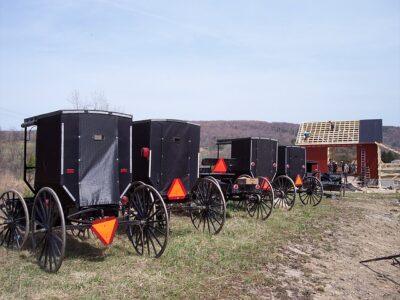
Visitors to my neighborhood in central Maine are often startled by the presence of Amish people. Locals, though, are accustomed to the yellow road signs with black silhouettes of horse-drawn buggies, tracks of bicycle tires and horse hooves in the snow on the shoulder, and the sight of women in bonnets and long dresses in line at the local grocery store. The handful of families that arrived eight years ago have grown into a sizeable and thriving group which coexists well within the greater community.
As neighbors, friends, vendors and customers, the Amish provide an integral niche in the lives of other residents. Sharing a region with the Amish is rewarding. They are my go-to for organic livestock grain, barn boots, fresh vegetables and kitchen gadgets, as well as the source for my full-sized wood cook stove.
I am a regular customer at an Amish dairy farm, as well. I drive out to the milk room every Saturday to pick up rich raw Jersey milk, leave off clean jars to be filled for next week, and drop my money into an open plastic bucket on the shelf.
Customers for ready-made buildings, bicycle repair, and charcuterie also seek out Amish businesses. But commerce goes both ways. The Amish buy from local merchants, hire drivers for transportation, provide education at agricultural events, and contribute to municipal building projects.
The Latest Solar Generators Are 4 Times More Powerful Than Previous Ones!
Living in close proximity to Amish people as I do, it is easy to observe the way they live. I often admire the large homes with tidy no-nonsense yards as I pass by, or smile at the sight of school-aged children helping parents hang laundry on the line or hauling firewood. While they are certainly human and by no means perfect, they do portray a highly venerable lifestyle.
My experiences with Amish people have led me to believe that there are many positive things to be said for the way they live their lives. Following are six ways that I think they are doing it right.
1. The community is everything. A friend told me a story of how, when she first arrived from out-of-state for the purpose of living sustainably, she told an Amish woman she encountered of her plans. “Oh my dear,” the Amish woman said gently, touching my friend’s arm, “you need community in order to do that.”
As a homesteader, I cannot agree more with that statement. Living on the land is a tough row to hoe for a single household. The sense of isolation and the feeling of being overwhelmed are two of the most common reasons people consider giving up homesteading.

Amish people band together for building homes and barns, tending animals and gardens, supporting one another’s economic endeavors, completing household and culinary tasks, and spiritual solidarity. They buy land and build homes in clusters that support their sense of collective cooperation in a way that much of mainstream society no longer does.
2. Technology is a tool, not a master. Contrary to popular belief, Amish people do use modern technology. They have very localized rules, enabling some groups to use technology more or differently than do other groups. I have seen Amish people ride buses, hire cars, keep telephones in outside buildings, operate chainsaws, and shop at big box stores. The line in the sand might be defined at that which keeps them adequately separated from those who do not share their beliefs.
I wonder if it is also a question of what serves whom—they seek to use that which will serve their needs and reject that which may come to control them.
3. Comfort and value trump trendy and superficial. When I see Amish people, they appear neat and put-together, in clothes that fit well and do not have holes or missing buttons. But while they do take pride in their appearance in that way—and I assume that most individuals try to look their best—they do not embrace mainstream trends.
Need Non-GMO Heirloom Seeds For Your Garden? The Best Deals Are Right Here!
I see fun holey rubber clogs on their feet, but no designer bags on their arms. It seems that value is measured by actual pragmatic use instead of by what is perceived as valuable to others.

4. They are not slaves to society’s expectations. Many Americans hate to let society control them, but most do not reject the insidious pressure to do so as well as the Amish. No big screen TVs. No fancy cars. No cruises. Nobody waxing or tanning beds. No political correctness. No four-star restaurants. No smartphones. No social media. All those things that mainstream culture tries to tell us we cannot live without? The Amish live without them.
At first glance, the Amish lifestyle seems restrictive. But when the absence of having to keep up with the Joneses is taken into account, maybe their lives are ones of freedom, not restriction.
5. They do not expect anything for free. Amish people work hard and expect to be paid accordingly, but do not ask to be paid extra. They ask nothing of the greater public and nothing of the government. They pay taxes like everyone does, and occasionally grumble about them like everyone does. But I would be surprised to see many Amish people applying for state benefits.
6. They do not lose sleep over politics. Without television or social media in their lives, many issues that flood mainstream airwaves can be lost on the Amish. Whether or not Sarah Palin knows about foreign affairs or whether Hillary Clinton used a specific email account to send sensitive documents—none of that matters to those solely focused on home and family. Amish people do hold strong opinions on many subjects, but do not get caught up into distant controversies.
It is true that no one culture has all the answers, and no single way of doing things is right for everyone. But the Amish do practice a lifestyle admired by many, and I count myself as fortunate to share my neighborhood with them. I appreciate the value they bring to the community, and I love the ways they do things right.
Do you agree or disagree? What would you add to this story? Share your thoughts in the section below:












